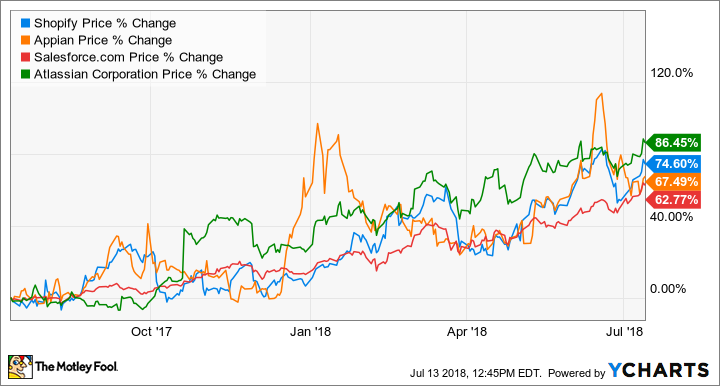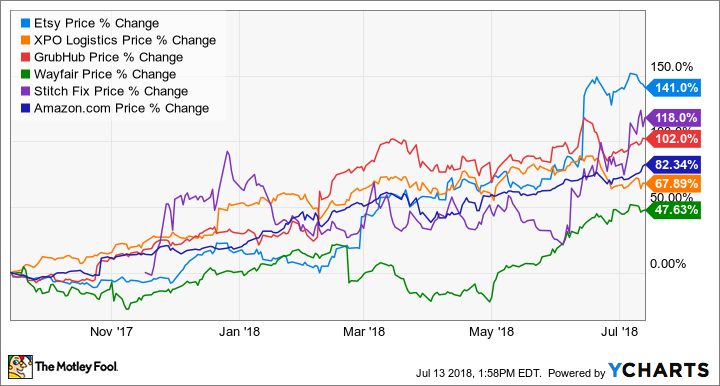2 Tech Sectors Every Investor Should Be In
Every investor wants blockbuster returns, and over the last decade the market has been generous about doling them out. Since the market bottom on March 9, 2009, the S&P 500 has more than quadrupled, while the tech-heavy Nasdaq has jumped more than 500%, good for sixfold returns.
While the last decade has clearly been a great time to be invested in stocks, the question for investors today is which stocks will continue to win in the future. A closer look at recent returns and future opportunities reveals two tech sectors in particular that stand out for continued gains: cloud computing and e-commerce. Below, we'll examine each to see how investors can benefit.

Image source: Getty Images.
The software of the future
Cloud computing has become a buzzword in investing and tech, encompassing other jargony terms like SaaS (software as a service), IaaS (infrastructure as a service), and IoT (the Internet of Things). The simplest way to understand the cloud is as a system that allows data and programs to be stored on the internet, rather than on a personal computer. The cloud is essentially a metaphor for the internet, and it allows businesses and individuals to meet their computing needs without tools like the disks that you needed in the olden days, or even software downloaded through the internet, like a Microsoft Office program.
The most important thing about the cloud is that it's scalable, which has made it a powerful tool for both users and the businesses supplying cloud software. Businesses need scalability in order to ramp up production along with demand, and cloud services like Shopify (NYSE: SHOP), Appian (NASDAQ: APPN), Salesforce.com (NYSE: CRM), and Atlassian (NASDAQ: TEAM) all allow businesses to scale up according to their own demand quickly and easily. As the chart below shows, demand for such services has driven all four of these stocks up by 60% or more over the last year:
The four companies serve businesses in different ways. Shopify is a platform for small-and medium-sized businesses to run e-commerce; Salesforce's software is designed for customer relationship management; Atlassian focuses on team collaboration; and Appian specializes in app development.
All four delivered revenue growth of 25% or better in their most recent quarterly reports. In addition to scalability, what makes these companies so potent is their inherent advantage over traditional software, and the network effects and switching costs they create: It's expensive and time-consuming for businesses to get set up with these systems, so it's costly to leave if they want to switch to a competitor. Also, since these products are usually subscription-based, profitability should expand as their subscriber bases grow.
Changing the nature of retail
Another long-term growth opportunity in a separate corner of the tech world is e-commerce. Like cloud computing, e-commerce has been steadily growing since the dawn of the internet, and should continue to grow as it takes more market share from traditional retail. Today, only about 10% of total retail sales come from the online channel, so there is still plenty of room for growth. Since the financial crisis, e-commerce sales in the U.S. have increased by about 15% annually.
Meanwhile, a wide range of stocks have thrived in e-commerce growth. Amazon (NASDAQ: AMZN) may be the most obvious, but there's also Etsy (NASDAQ: ETSY), Wayfair (NYSE: W), GrubHub (NYSE: GRUB), XPO Logistics (NYSE: XPO), and Stitch Fix (NASDAQ: SFIX).
As the chart below shows, all six of these stocks have tacked on 47% or more in the last year:
Like the group of cloud stocks, each of these has its own specialty. Amazon needs little introduction, as it now controls nearly half of all e-commerce sales in the U.S. Etsy is the biggest seller of handmade and craft goods, and has successfully defended itself against a challenge from Amazon. GrubHub is the leader in restaurant takeout delivery, growing both organically and through acquisitions with the help of key partnerships like one with Yum! Brands. Wayfair is building a niche in online furniture retail. XPO Logistics is not a retailer, but a freight and logistics company that specializes in last-mile delivery for heavy goods like furniture and appliances, which are more frequently being ordered online. Finally, the personalized styling service Stitch Fix has impressed the market though it's been public for less than a year.
Like the cloud, e-commerce should have more growth ahead as complementary technologies improve. For instance, faster and easier delivery using vehicles like drones or self-driving cars will only bring down shipping costs and make online shopping even more convenient. Voice-activated technology like Amazon's Alexa is also helping to make ordering even easier. There will always be a need for physical retail for some things, but e-commerce should continue to capture share from the brick-and-mortar channel for many years to come.
While there's no guarantee that these stocks will continue to perform like this, the consistent growth of these industries and each company's leadership in its particular niche are components that often translate into market outperformance. Don't be surprised if their upward march continues.
More From The Motley Fool
John Mackey, CEO of Whole Foods Market, an Amazon subsidiary, is a member of The Motley Fool's board of directors. Teresa Kersten is an employee of LinkedIn and is a member of The Motley Fool's board of directors; LinkedIn is owned by Microsoft. Jeremy Bowman owns shares of Shopify, Stitch Fix and XPO Logistics. The Motley Fool owns shares of and recommends Amazon, Appian, Atlassian, Salesforce.com, Shopify, Stitch Fix, and Wayfair. The Motley Fool recommends Etsy and XPO Logistics. The Motley Fool has a disclosure policy.

 Yahoo Finance
Yahoo Finance 

